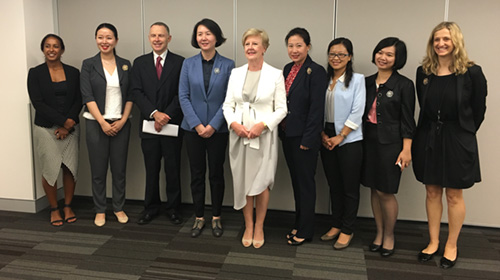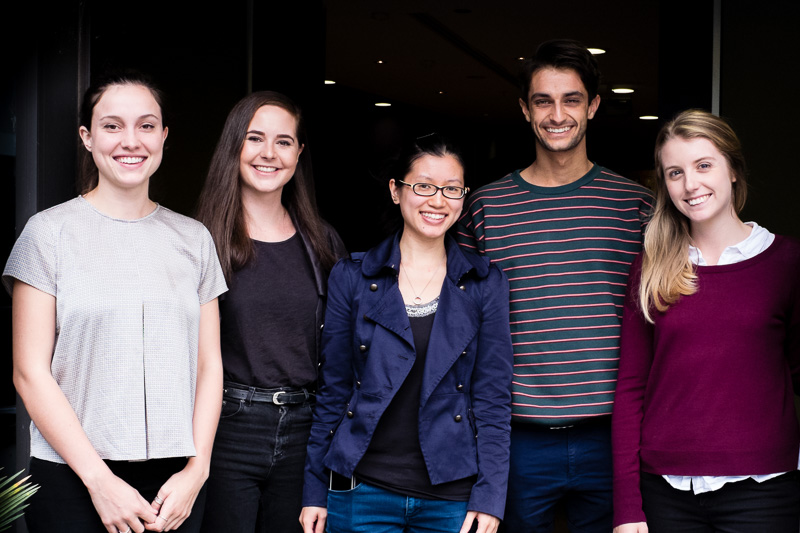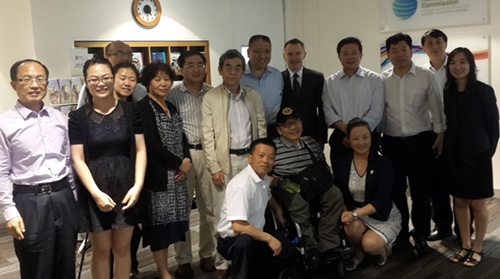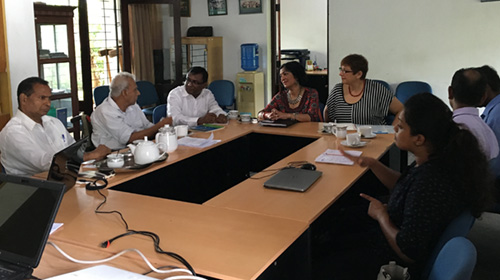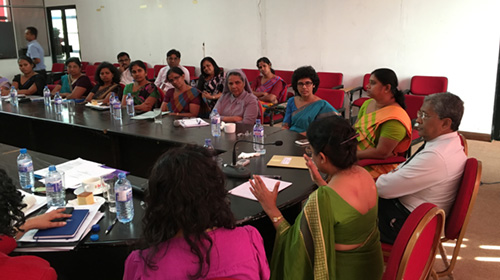HRTC highlights newsletter - Jan 2017
Working internationally to advance human rights
Welcome
HRTC Highlights is a bi-annual newsletter that provides updates on Human Rights Technical Cooperation (HRTC) Programs and other international activities undertaken by the Australian Human Rights Commission.
Contents
- Advancing DV crisis intervention
- Civil society development in China
- UNSW student interns focus on children’s rights in China
- Disability rights training
- New program of work with Sri Lanka
Advancing DV crisis intervention
The China-Australia HRTC Program continued to address domestic violence and women’s rights in 2015-2016, with three activities undertaken in partnership with the All China Women’s Federation (ACWF) including a capacity building program, internships, and a seminar on the ACWF’s five-year work plan.
Capacity Building Program for DV Crisis Centres:
A capacity building program for four pilot domestic violence crisis centres - located in Luquan, Changsha, Changzhou, and Beijing – was undertaken from July 2015 – June 2016. The program aimed to improve service standards by providing training to staff and volunteers.
The centres, alongside with local women’s federations, also implemented public education campaigns and provided guidance on national domestic violence legislation to the police and courts. Innovative campaign methods included the use of WeChat, China’s main social media platform, to deliver domestic violence information to the community and stakeholders.
The ACWF reported that, “anti-domestic violence awareness in the community has been enhanced, the reputation of the centres has been spread, and more people have come to us for help”.
Domestic Violence Internships:
Five ACWF delegates took part in an internship program in Sydney from 29 February–11 March 2016, with comprehensive crisis intervention training provided by Rape and Domestic Violence Services Australia (RDVSA).
One of the delegates remarked, “through the internship, I’ve learnt a lot about how a specialty organisation supports victims of domestic violence and sexual assaults, including its vision, procedures, staff development and co-operation with other agencies”.
Delegates from the All China Women’s Federation, who undertook domestic violence internships in Sydney in February 2016, photographed with Australian Human Rights Commission President, Gillian Triggs, and International Program Team staff
Seminar on Safeguarding Women’s Rights:
This seminar, held in Chongqing from 16–20 May 2016, aimed to enhance the ACWF’s ability to implement their five-year work plan (2014–2018). Key topics included domestic violence, gender discrimination in the workplace, dispute resolution, and the role of social media in publicity campaigns to promote gender equality. Projects related to child protection, women with disabilities, and poverty alleviation for women, were also discussed. The seminar was attended by 141 participants including ACWF leaders, local women’s federation staff, and a small team from the Australian Human Rights Commission.
Civil society development in China
Beijing Zhicheng Legal Aid Organisation (BZLAO) holds a unique position in China, as an independent community legal service. During 2015-2016, BZLAO undertook comparative research on civil society reform in order to inform advocacy efforts fora freer civil society in China. This activity comprised the final year of a three-year project on civil society reform, implemented by BZLAO under the HRTC Program.
A research team of five BZLAO public interest lawyers sought to examine a range of legal and practical issues affecting the operation of civil society organisations in China, studied Australian organisations as a reference for Chinese law and policymaking, and conducted small-scale discussions and training for grassroots non-profits.
The research was informed by the direct experience of 56 civil society organisations that participated in the consultations. A wide range of stakeholders contributed to the activity including academics, legislators, as well as student interns from India and the United States.
According to BZLAO, the research project provided valuable information on the regulation, governance, and operations of civil society organisations and related issues including property rights, funding, taxation incentives, and volunteer management. BZLAO strengthened its contacts with key representatives of civil society organisations and is now better placed to engage them further in reform issues.
UNSW student interns focus on children’s rights in China
UNSW interns at BZLAO
Five Australian law students from the University of New South Wales (UNSW) undertook internships at BZLAO’s office in Beijing from 27 June - 22 July 2016, under the HRTC Program. The internships were coordinated in partnership with the Australian Human Rights Centre in the UNSW Law Faculty.
Research undertaken by the students supported BZLAO’s efforts to establish an international NGO to advance children’s rights. Subject areas included children and criminal justice, trafficking of children, online child pornography, and the impact of environmental and business practices on children.
BZLAO strongly praised the work undertaken by the interns. “The researchers helped to map the key issues on child protection in the world…[They] made contributions based on their knowledge and research skills. It will be a great added value.”
The students met with a variety of Chinese organisations including the Fengtai District People’s Court, Zhonglun Law Firm, and the China University of Political Science and Law, and observed proceedings in a local court (usually not permitted for foreigners). In addition, they participated as presenters in an international students’ forum on public interest law and assisted BZLAO to develop a new website and social media strategy.
The UNSW Australian Human Rights Centre reported that, “the overall research experience was invaluable, as the students were able to conduct in-depth, self-directed research projects in a unique, cross-cultural environment”.
Disability rights training
CDPF study visit delegates with International Program Team staff
Established in 1988, the China Disabled Persons’ Federation (CDPF) represents the interests of China’s 83 million persons with a disability. [1] In 2016, two HRTC Program activities, undertaken with the CDPF, sought to enhance the capacity of provincial disabled persons’ associations (Associations) to represent the rights of people with a disability in their communities.
The activities with CDPF included a workshop in Guangzhou from 18-20 February 2016, followed by a study visit to Sydney from 22-26 February 2016, both of which were attended by a 14-member delegation that included leaders from provincial associations and CDPF officials.
During the workshop, participants from Guangdong, Guangzhou, Jiangsu and Gansu examined the role and functions of Associations, for example in providing guidance on Chinese law and policy relevant to people with disabilities. They also discussed how to advance the role of Associations and other civil society organisations in disability service delivery and how to attract more professionals to the sector.
The visit to Sydney provided the delegates with insight into person-centred approaches and disability rights. In meetings with organisations such as People with Disabilities Australia and the Centre for Disability Studies, the delegates learnt about Australian laws and policies such as the National Disability Strategy 2010-2020, the Disability Discrimination Act 1992 (Cth)and the National Disability Insurance Scheme (NDIS). The implementation of the UN Convention on the Rights of Persons with Disabilities was also a key focus.
The CDPF reported that learning about the NDIS was especially valuable as it provides a model where individuals have choice and control over the services they receive. The delegates also expressed a strong interest in disability employment programs and the role of NGOs in providing varied services such as legal advice, advocacy, mobility, animal assistance services, and interpreting services.
The study visit enabled Chinese and Australian participants to network and establish connections. Delegates participated in break out group sessions with organisations such as the Deaf Society of NSW, Vision Australia, and the Physical Disability Council NSW, to share experiences about specific areas of work.
New program of work with Sri Lanka
The Australian Human Rights Commission undertook two major activities in 2016 with Sri Lankan human rights organisations, sharing key areas of interest and developing relationships and a new program of work.
Disability access project:
Human Rights Commission of Sri Lanka and Australian Human Rights Commission staff consult with the Disability Organisations Joint Front
The Commission commenced a program of cooperation with the Human Rights Commission of Sri Lanka (HRCSL) focused on disability rights. The program, funded by DFAT, specifically aims to strengthen implementation of building regulations for accessible public facilities. The program will also provide disability rights capacity building for HRCSL staff.
Project planning and stakeholder consultation meetings were held in Colombo on 2-5 November 2016. Australian Human Rights Commission staff met with HRSCL Chairperson Udagama, Commissioners, project staff, disability persons advocates, and government officers. A range of training and additional consultation activities will be held in Sri Lanka over the coming months.
Sri Lanka study visit on human rights and equality promotion:
Human Rights Commission of Sri Lanka consultation with Government officials involved in the implementation of the building regulations
Senior officials from Sri Lanka visited Sydney and Canberra, from 15-22 February 2016, to explore Australian systems of promoting tolerance, harmony and multiculturalism as well as mechanisms for protecting fundamental rights.
The study tour was funded by DFAT through the Australia Awards program and organised by the Australian Human Rights Commission. The six-person delegation included four Ministerial Secretaries of the Sri Lankan Government and two senior officials from the Sri Lankan Office for National Unity and Reconciliation (ONUR).
During the visit, the delegates met with a diverse range of organisations working on issues related to Australian social justice, human rights, reconciliation and multiculturalism. The delegates expressed particular interest in reconciliation action plans (RAPs), language services for Indigenous Australians whose first language is not English, and the representation of Indigenous people in Australian parliaments.
A number of discussions about how the RAP model could be adapted to the Sri Lankan context were initiated by the delegates subsequent to a meeting with Reconciliation Australia. The delegates were also impressed by the Commission’s “Racism. It Stops with Me” campaign and considered the application of such a campaign in Sri Lanka, particularly the scope to include promotion by Sri Lankan cricketers and other national celebrities.
Note: The views expressed in the publication don’t necessarily reflect those of the Australian Government.
NOTES
[1] Statistic provided by CDPF


